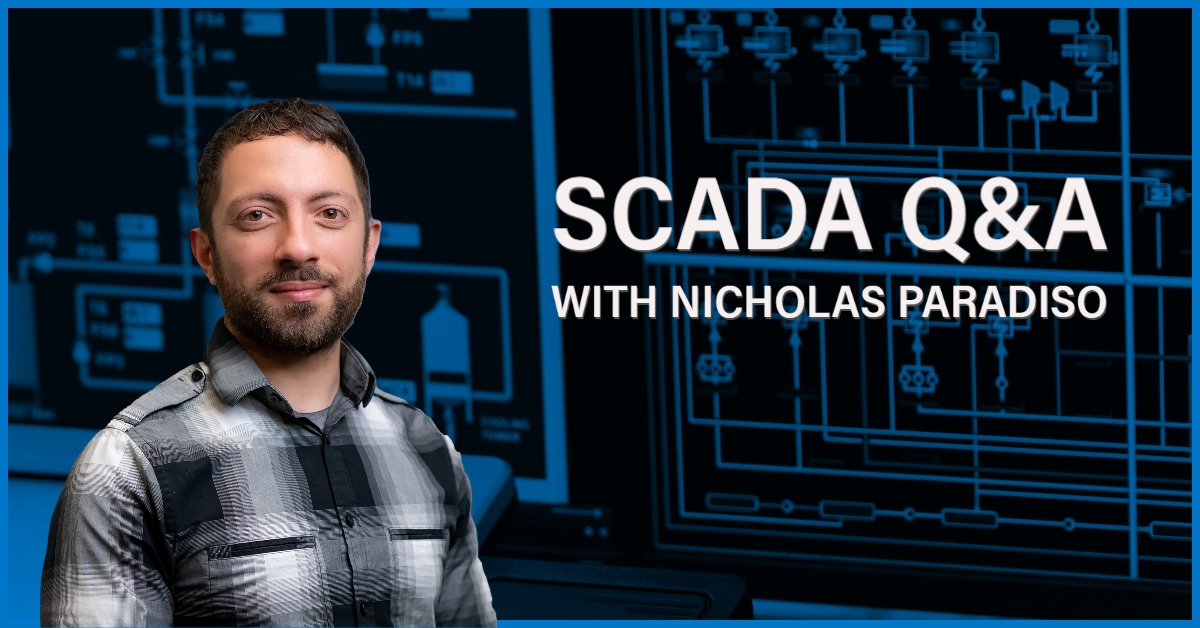
SCADA Q&A with Nicholas Paradiso
SCADA systems can greatly enhance the operations of your water/wastewater system. SCADA (Supervisory Control and Data Acquisition) systems are control hardware/software systems that provide automated control and monitoring of the treatment processes. These systems can provide critical information during emergencies, allow an operator to remotely monitor system status, and provide engineers with valuable data to properly design upgrades and understand typical system usage.
Q. What exactly is SCADA?
A. The term “SCADA” is used in many ways to describe the control hardware and software related to process control systems. For the purposes of this article, SCADA is defined as the computer hardware and software that provides a graphical interface, data collection and alarm notification for a treatment system. All treatment processes require some type of instrumentation and automated controls (such as relay logic or a programmable logic controller). These items are a fundamental part of the treatment process and for the purposes of this article not considered part of the SCADA discussion.
Q. Will a SCADA System take the place of an Operator?
A. No, SCADA will not replace an operator. Consider a SCADA system as a tool. This tool provides operators the ability to control and monitor treatment processes that they are responsible for 24/7. SCADA makes operators’ lives easier by helping automate the data collection necessary for regulating agencies, as well as providing detailed alarms when both critical and non-critical issues occur. SCADA is a standard of living adjustment, and allows operators to focus on other area of their job, such as optimizing plant efficiencies using the data obtained from the SCADA system!
Q. Will putting my treatment process on the internet make the process more vulnerable to cyberattacks? Won’t my facility be at a higher risk of being hacked?
A. Cybersecurity and hackers; the buzzwords of the 2020’s! Why do most systems get hacked? The truth is that poor maintenance, incomplete policies, and unenforced procedures can make your system vulnerable. Just like any other system, SCADA systems need proper safety guards and routine maintenance to ensure the systems are secure and running in tip-top shape. Often, “hacked” systems were compromised by an unauthorized user using passwords that were shared amongst multiple users, or because the systems were relying on outdated equipment and software.
Q. Can you explain a bit more about Cybersecurity?
A. Put simply, think of cybersecurity as access controls for your computer systems. For example, at a water treatment plant, typically a security fence surrounds the site with a locked gate to prevent unauthorized personnel from walking in and doing something malicious. A facility may also have security cameras and keys or key-codes to access certain rooms within the facility. Cybersecurity is very similar. Instead of a physical fence that surrounds the perimeter of a physical site, a firewall is installed between your plant’s SCADA network and the Internet. Similar to the use of security cameras to monitor your facility, you may have network monitoring devices installed that check what data is coming into the plant and what data is going out of the plant. If the device identifies data that is suspicious, the data is recorded and IT personnel possibly notified. Finally, like keys or keycodes, you may have a password or two to access setpoints or SCADA software. No different than physical access; if done right, secure passwords can mitigate your risk from a malicious attack.
Q. A SCADA System sounds expensive. What’s the typical cost?
A. A SCADA system (computer hardware/software) can be installed for just a fraction of the total construction cost of a project (typically less than 1%). Put simply, the return on investment for a SCADA system can be realized with just one critical alarm. Should something occur in your plant while an operator is not on site, any number of things can go wrong that could cost the utility well beyond what the SCADA system would cost to design, implement, and maintain. SCADA gives you piece of mind and accountability. As public servants, we aim to put our best foot forward to ensure that we treat public water to the best of our ability – 24/7/365. What better way to accomplish this than with a SCADA system that monitors your treatment processes and KPI’s at all times?
A SCADA system is a small investment with BIG returns. Contact our Technical Director of Automation Nicholas Paradiso, PE at nparadiso@goconcentric.com to discuss how SCADA can make your operations more efficient.